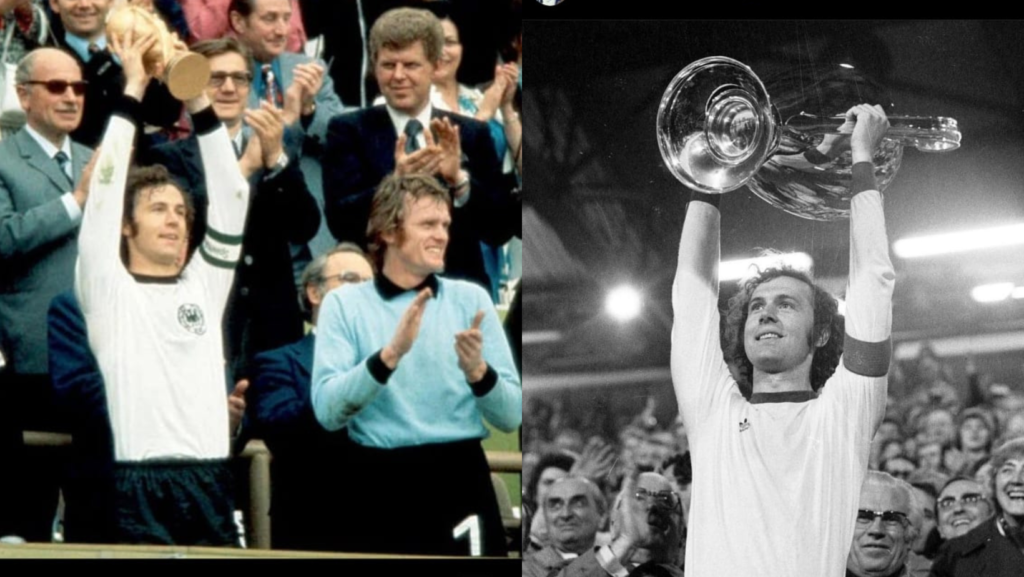
Franz Beckenbauer’s indelible mark on football history extends far beyond his popularisation of the libero position and his instrumental role in establishing Bayern Munich as a powerhouse in German football. As one of only three individuals to win the World Cup both as a player and a manager, Beckenbauer’s legacy is truly exceptional.
His iconic nickname, “Der Kaiser”, adds a layer of mystique to his persona, evoking both authority and respect. The origin of the appellation remains a subject of debate, with some attributing it to a photo session next to an emperor’s bust, and others linking it to an on-field triumph over a German opponent known as the King.
Beckenbauer’s statesman-like presence transcended his playing days, extending into his managerial and administrative roles. Hailing from a modest, war-ravaged Munich background, he stood out as a football figure cut from a different cloth.
In contrast to the nickname that Beckenbauer was known by, Didier Deschamps – winner as player in 1998, and as coach two decades later – had to endure “water-carrier” jibes from one-time teammates. As for Mário Zagallo, who was the first to achieve the most unique of doubles, he had monikers like “The Professor” and “Old Wolf”, but none carried the weight and reverence of Beckenbauer’s title.
Zagallo’s World Cup record, with victories as a player, manager, and assistant manager, is notable, yet Beckenbauer’s accomplishments closely rival them. Runner-up in 1966 as a player and in 1986 as a manager, Beckenbauer secured World Cup victories in 1974 as captain and 1990 as coach, before successfully leading Germany’s bid for the 2006 World Cup.
Beckenbauer’s involvement with FIFA, however, faced scrutiny, with allegations of false financial declarations and money laundering. Despite protests of innocence, his trial on corruption charges ended without a verdict in April 2020, leaving the issue unresolved.
Known for holding English football in high regard, Beckenbauer gained prominence in 1966 when tasked with nullifying Bobby Charlton in the World Cup final. Although the plan was only partially successful, Beckenbauer’s overall impact, finishing joint-third top scorer as a 20-year-old midfielder, left an enduring impression.
The 1970 World Cup showcased Beckenbauer’s prowess, with West Germany overcoming England from 2-0 down in the quarter-final. But dreams of a second successive final disappeared when he had to play over 50 minutes with a dislocated shoulder in the semi-final against Italy. It was only four years later, on home soil, that he could lead his team to victory in the final, securing their second World Cup.
Transitioning to coaching after his playing career, Beckenbauer reached the World Cup final in 1986, facing defeat to Diego Maradona’s Argentina. Four years later, he gained revenge, winning 1-0 against Argentina in Rome.

In Germany, Beckenbauer was synonymous with Bayern Munich, reshaping the sweeper role at the club level to maximise his offensive and defensive capabilities. The club’s success, including three consecutive European Cup triumphs between 1974 and 1976, underscored Beckenbauer’s influence.
As well as being captain during those victories, Beckenbauer achieved a rare feat of holding both World Cup and European Championship titles simultaneously. While other players may have had superior individual skills, Beckenbauer’s consistent excellence in achieving milestones set him apart.
In reflecting on his extraordinary career, it becomes evident that Beckenbauer’s impact transcends titles and trophies. Der Kaiser’s imprint on football history is a testament to his versatility, leadership, and role in shaping the beautiful game, on and off the field.



